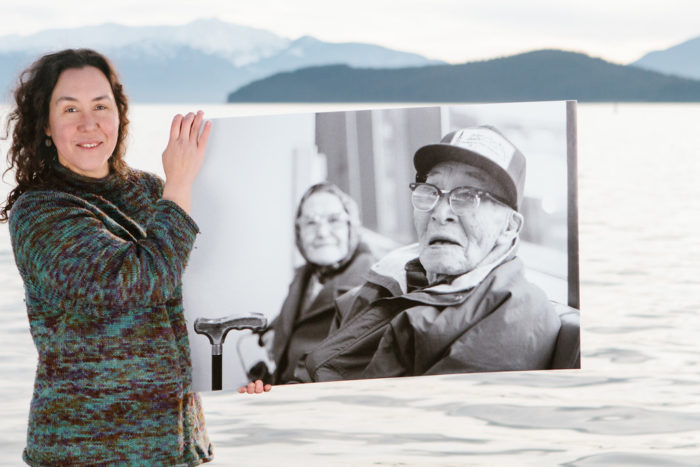Narrative and photography by Mihael Blikshteyn. Commissioned by The Salmon Project for the Salmon Love, Salmon Life stories in 2015. Reprinted with permission.

Surrounded by flat, low-lying lands, punctured by numerous lakes and intertwining streams, Naknek River feeds into Kvichak Bay, an arm of Bristol Bay, supporting the largest sockeye salmon fishery in the world. It’s tundra – vast, flat and mostly treeless.
“The tundra environment is so special, chugging across the tundra, the wonderful smell, the berries”, reminisces Melanie. Now living in the rainforest of Southeast Alaska, Melanie Brown grew up commercial fishing with her family on Naknek River.
“Even when I was small, I was taller than most of the trees. And now the alders have taken off, they block your view, generally, where there is a disturbance, like buildings or roads… but you walk away from the roads, and it’s open tundra. You can see forever.”
Naknek is a small fishing village, sitting on the north bank of the Naknek River. It boasts a few hundred permanent residents, but swells to thousands in mid-June, when fishermen arrive in anticipation of returning sockeye salmon, the gold stream of the region.
One of Naknek’s long-term residents was Melanie’s great-grandfather. An Aleut who spoke Yupik, Paul Chukan was born in 1901. Fishing was his way of life, his life in Naknek.
“When I first started fishing, my great-grandpa, Paul Chukan, was still part of our family operation. We didn’t fish out of a skiff at the time because I was too small to be effective out on the water, my [great]-grandpa’s eyes were too weak to be out in the boat safely, and my mom knew she would not be able to keep him off of the water if we had a skiff ready for picking.”
Using set gill nets, they caught sockeye salmon charging up the river along the river bank or rolling downstream with receding tide. Paul would set the net at low tide, perpendicular to the river bank, carrying it on his shoulders through the mud of the river bank, anchoring it above the water level. He would walk back, feeding the mesh off his fingers, laying the net in wait of the incoming tide.
With tide fish would come in, salmon going upstream, smelling their way to their natal spawning grounds, waters they left as tiny fry several years ago. Some would avoid the nets, reaching the lake and its tributaries, where they would spawn and die protecting their eggs. Others would get caught in Paul’s net or the nets of the other fishermen.
When Melanie turned 10, the legal age to start helping, Melanie’s mom said it was time for her to join the family fishing operation. It was exciting, to be old enough to be part of the family operation, to officially join the famed Bristol Bay sockeye salmon fishery.
“Because I was little I got eased into it.”
Her first job was to haul fish picked from the set net up the beach to be delivered. A fish truck would drive down to the river bank to pick up the fish. It would collect freshly-caught salmon and take them for processing to the nearby fish-processing plants.
“Sometimes I had to haul the fish by hand. Just string them on [my] fingers, hook the fingers into the gills and walk up with them in [my] hands.”
“When I first started fishing, I didn’t know how to pick fish yet – that’s a task onto itself. [That] job was important, to get the fish up to be delivered, so that was my job.”
“We had some mechanical aid, too, a Ranger. It was like a small tractor, it had a box built onto the back… so when the fish were picked, we would put them in the back of that Ranger and then haul them up the beach. [But we] only used it when dealing with really high volume, pile them up and then they get delivered.”
“It was not until my second or third season that I was given the opportunity to help pick fish. Up until that point I was only responsible for making sure that the fish made it up the beach where they would be picked up for delivery.”
“One time my [great]-grandpa and I were left to pick a piece of gear after it had been floated up the beach and the rest of our crew went on down to pick our other site. We had a lot of fish to get out of the gear, but my young and awkward hands kept working through it as my [great]-grandpa and I worked side by side. I was happy to be doing something other than hauling and happy to be with my [great]-grandpa. Although he could not see the fish very well with his old eyes, his hands knew how to get through the gear. The longer we picked, the less clumsy my hands felt. As I felt my skill growing, next to me I could feel my great-grandpa’s strength waning and I could not help but have mixed feelings. Those feelings quickly subsided when I sensed my great-grandpa’s pride. It was as if I could feel him passing a torch of sorts.”
“My [great]-grandpa had a generosity of spirit that made him a truly great [Great]-Grandfather.”
